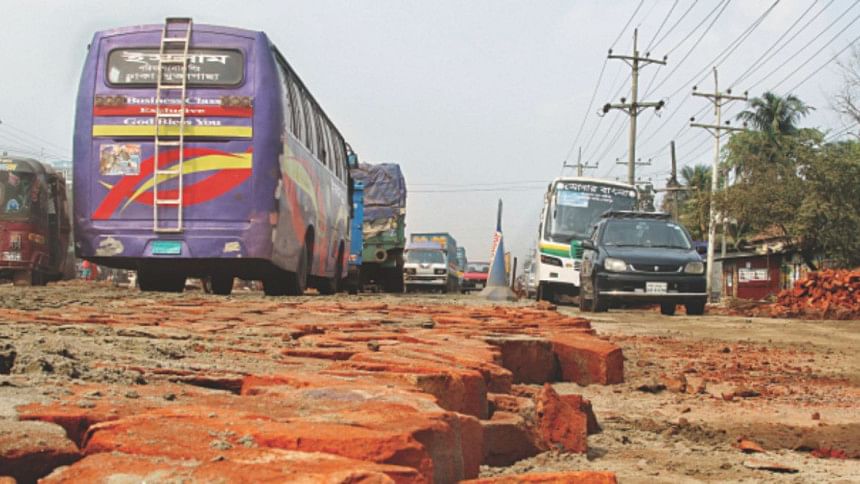A journey by bus from Dhaka to Nalitabari

Shouldn't people derive delight from travelling? Then why is it such a nightmare for people who use public transport in Bangladesh? My short story of a journey by bus from Dhaka to Nalitabari may give readers a glimpse of why.
I used to start my journey to our ancestral home in Nalitabari usually on a Friday morning. Given the distance, the journey shouldn't take more than three to four hours.
Since three-wheelers don't follow any rules, CNG drivers often try to read your mind like psychologists and squeeze out whatever fare they can from your urgency in the morning. When you reach the Mohakhali Bus Terminal, it will be full of life like New York City's Port Authority Bus Terminal, but with the additional honking of vehicles and screaming of transport workers resembling a disaster-hit-zone.
Passengers are stranded here and there, bus stands are everywhere, women are helpless, waiting rooms are absent and bathrooms are as dirty as they get, although you must pay to use them. There are no rules on how buses should exit the terminal and get onto the road; you will face gridlocks; hear helpers shouting; and find it difficult to reach your desired ticket booth. Still you must gird up your loins for further adventures.
The bus fare from Dhaka to Nalitabari has remained around Tk 300 for years, ignoring the "peanut-like" fuel price adjustments by the energy ministry. Had the adjustments been any bigger, I doubt whether bus owners would have increased fares as they believe in Keynesian economics of downward rigidity of prices. Even three days before (either) Eid they would charge you only double the standard fare, applying the price determination theory and the fair play of demand and supply.
Most buses will claim to be nonstop, express, first class and of business-class quality—all lies. Try to avoid the seats at the extreme end as that would surely lead to abdominal pains from travelling on roads that mimic the moon's surface. Avoid front seats as well because the driver will resort to braking hard on multiple occasions, getting you to dash against the partitioning grills or windshield.
Some passengers will be forced to sit around the gear box, while others may rest their heads on your lap, fatigued from the endless side-to-side and back-and-forth motion. Carry anti-vomiting tablets because the conductors may run out of plastic bags.
There is no standard space between seats. You would be lucky if your height is less than five feet and your legs are unusually short to fit on a window-side seat. Do not complain if the seat is broken, its handle has fallen apart and the window glass is missing. The conductor will offer you an alternative seat on a bamboo stool randomly placed in the aisle along with ducks, hens, or goats.
The seat cover is usually torn out to let bugs travel freely from their dens to your skin; be tolerant towards them if they only occasionally bite you. Do not be too concerned as human bodies can donate blood regularly with only an eight-week interval in between. Any attempt of yours to take a nap while travelling will fail for a number of reasons. Sometimes buses will stop in the middle of the road and drivers will engage in cursing each other in an attempt to prove who knows the rules of the road better.
Your journey from Mohakhali to the airport will hopefully be all right, but the real misery begins from there till you cross Gazipur. That is perhaps where the country's infrastructure faces the worst kind of problems. You will notice drains on both sides of the road; hold your handkerchief to your nose like a newly wedded groom, you are going to need it. From Gazipur to Mymensingh, the journey should be speedy because it is supposedly a four-lane road. But that, again, is another deception. Slow-moving vehicles such as Korimons, Nosimons and Bhotbotis are banned on highways. Who cares? They swagger daringly and even move in the wrong direction, forcing speedy vehicles to come to a grinding halt. When ghastly accidents happen, we become fatalists, providing complete impunity to such wrongdoers. There are no rules on how to overtake vehicles in front.
At some point, you will reach Mymensingh after having faced a number of jams at every little town where there are other buses. They are comfortable picking and dropping passengers right in the middle of the road. The police look at it as normal.
Things get difficult again at least until you have passed the Brahmaputra Bridge, which often turns into a parking station, just like the hanging garden of Babylon. After crossing Tarakanda, Fulpur and Nakhla, you will definitely reach Nalitabari at some point and remember the journey for the rest of your life—gratefully, too, as you are still alive.
Do not attempt to say anything to the driver, doesn't matter if you think it valid. Remember, fights may jeopardise your life. Do not forget, their leader is very powerful and is probably sitting cosily somewhere in Dhaka.
Biru Paksha Paul is associate professor of economics at an American university.
Email: [email protected]





Comments